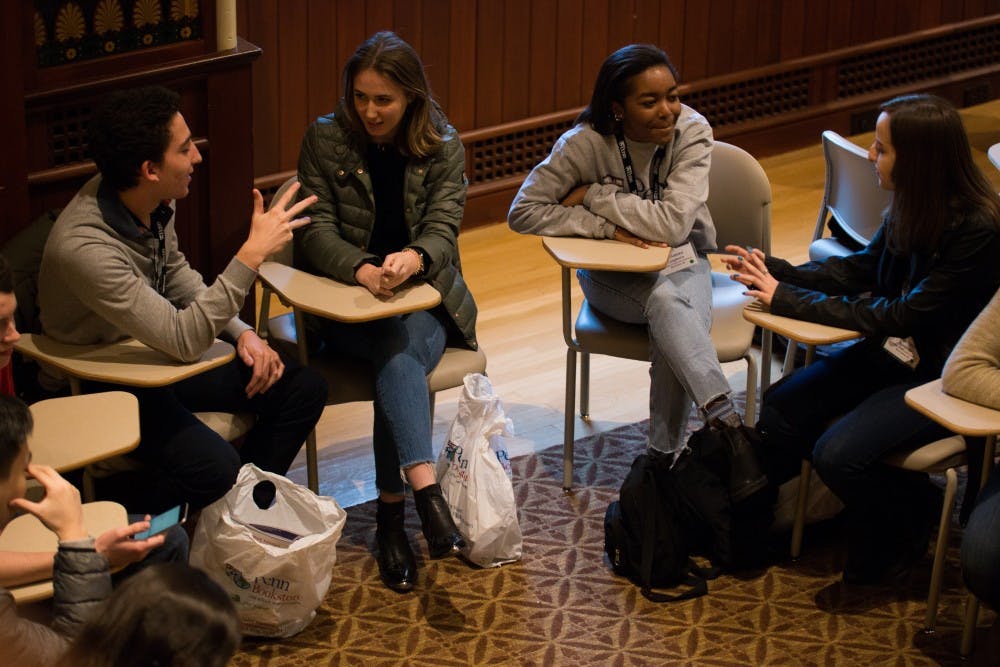
On Oct. 7, less than a month before the early decision admissions deadline, 113 high school seniors from 32 states across the country arrived on campus as part of the Penn Early Exploration Program.
Now in its fifth year, PEEP is an annual three-day event intended to give talented students from underrepresented backgrounds – especially those who are first generation and/or low income – information about Penn as well as general advice on applying to college.
PEEP participants stayed with current Penn students in various dorms, and the University covered the cost of their travel, housing and food for the duration of the program.
During the three-day event, participants attended workshops on admissions and financial aid. They also participated in panel discussions — including one featuring current Penn students — to learn about University life outside the classroom, as well as resources like the Weingarten Learning Resources Center and Counseling and Psychological Services.
Penn’s Associate Dean of Equity and Access Nicole Maloy said the program launched in line with President Amy Gutmann’s Penn Compact 2020 – a plan that aims to prioritize inclusion, innovation, and impact.
Maloy, a 1995 Wharton graduate, emphasized that the program was not just designed to acquaint students with Penn, but also to help them become better-informed applicants to any college they wish to apply to.
“We also want to make sure that they have the chance to learn as much as they can about the application process itself,” Maloy said. “So wherever they ultimately apply, we know that they will be stronger college applicants and of course we hope that for many of them, Penn will be on that list.”
Participants also had the opportunity to sit in on classes, take a bus tour of Philadelphia and attend a dinner where professors from the College, Nursing, and Engineering Schools gave mini-lectures and answered questions.
Maloy said PEEP has grown since its inception in 2014, though the University no longer releases data on the number of students who apply to attend the program. In 2015, The Daily Pennsylvanian reported that 93 students from 23 different states attended the program, out of a pool of about 300 applicants.
To apply to PEEP, students must submit academic records, extracurricular activities and a letter of recommendation. They must also write an essay about their academic interests and how they envision “shaping [their] college experience to enable [them] to impact society.”
Jennifer Tegegne, a high school senior from Northside College Prep in Chicago, Illinois, said her time at PEEP has peaked her interest in Penn and has given her a clearer version of the type of college she hopes to attend.
“So far the program has helped me really understand what kind of college I'm looking for,” Tegegne said, “Not just how I'm interested in Penn, but also seeing that I enjoy a bigger school that has a bunch of resources with research.”
Lauren Kim and Oralia Quinones, also seniors form Northside Prep, agreed with Tegegne. Kim said she appreciated learning about the interdisciplinary nature of Penn, and is excited about the prospect of pursuing music, chemistry and neuroscience during her college career.
“[PEEP] did a real good job at showcasing Penn, for all of it... like we went sightseeing too and went up to where Rocky was recorded and that was really cool,” Quinones said.
However, Maloy said that although a large number of PEEP participants do choose to apply to Penn, attending PEEP does not directly impact their chance of being accepted.
“The fact that they have the opportunity to be here and see the campus is something that's going to influence the way they speak about why they're interested in Penn,” she said. “So that's something that can enhance their ability to communicate to us why they see a fit between themselves and the University of Pennsylvania.”
The Daily Pennsylvanian is an independent, student-run newspaper. Please consider making a donation to support the coverage that shapes the University. Your generosity ensures a future of strong journalism at Penn.
Donate







